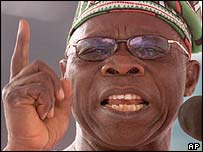Dissatisfied with the level of poverty in the country, President Obasanjo threw his last punch on the Nigerian masses, hiking fuel pump price from N65 per liter to N75, in less than 48 hours left for his presidency. The shameful hike is the 13th since 1999 when the retired army General took over. The 15.4 per cent shot squarely rested the denial by Nigerian National Petroleum Corporation (NNPC) that the government had no hidden agenda on the cards, argued right from January when the suspicion began. |
|
|---|---|
One motorist on Sunday called it "Obasanjo’s evil parting gift to Nigerians" as he prepares to hand over the helmsmanship to Umar Yar’Adua tomorrow, a sentiment echoed by the Action Congress, which sees it as an unkind cut. Filling stations have adjusted their pumps to the new price template since Saturday night, based on a directive by the Petroleum Products Pricing Regulatory Agency (PPPRA) to marketers. The price increase came on the day NNPC chapters of the National Union of Petroleum and Natural Gas Workers (NUPENG) and the Petroleum and Natural Gas Senior Staff Association of Nigeria (PENGASSAN) called off their strike to protest the sale of refineries and depots. They said they took the decision to ensure a smooth handover of government. PPPRA Executive Secretary, Oluwole Oluleye, justified the fuel price rise, saying market fundamentals made it inevitable. He said the N100 billion appropriated in this year’s budget for the Petroleum Support Fund (PSF) to moderate supply is inadequate, with the government still subsidizing fuel pump price by N20 per liter. "Last year," he narrated, "the government appropriated N150billion for the PSF. This year, N100 billion was appropriated out of the N250 billion we asked for. The N100 billion could only support supply to the tune of N30 per liter, which means the government was still subsidizing by N20 per liter. At this point, it became inevitable that the government had to transfer the burden of N10 per litre to the consumers." The AC described the price increase as cowardly, vindictive, and a deadly parting gift to a suffering people. Its National Publicity Secretary, Lai Mohammed, argued in a statement on Sunday that "to cap these past eight years of bad governance, policy flip flops and wasteful spending, this administration has inflicted on the citizenry another hardship in the twilight of its existence. "Perhaps it is Obasanjo’s way of punishing Nigerians for opposing his quest for an unconstitutional third term, especially when seen against the recent similar hike in VAT (value added tax) from five per cent to 10 per cent." Mohammed wondered why Obasanjo sprang the increase as a surprise, instead of publicly announcing and justifying it, if he is sure it is the right thing to do. He questioned the propriety of raising domestic fuel price when Nigeria is reaping a fortune from high prices of oil on the international market, whereas such extra earnings could be used to cushion the effect of the cost of fuel imports. The AC described as unfortunate the fact that the Obasanjo administration continued to import fuel for domestic consumption, as the four refineries are left to rot so they can be easily disposed off to his cronies at give away prices – as done with the Port Harcourt Refinery. An angry human rights activist, Bamidele Aturu, described the increase as "sheer wickedness and provocative." He doubted whether Obasanjo is interested in making Nigerians happy and alleged that he wants to provoke a crisis so he could stay on. His words: "I think the man is trying to provoke Nigerians, so there will be riots and there will be no handover. He has missed it completely. Nigerians will protest against this callous increase and he must go, whether he likes it or not." The Senior Staff Association of Electricity and Allied Companies (SSAEAC) latched on to the views and pledged to proceed with its strike scheduled to commence on Wednesday, the day after Yar’Adua’s inauguration. The workers want the government to rescind its decision to sell off the Egbin thermal power plant, the largest generating plant in the country recently sold for "a ridiculous price" as some put it. SSAEAC President, Godwin Ifeanacho, said the union will embark on the strike because giving away the plant is not in the national interest. He argued that producing 620 mega watts (mw), half its capacity, Egbin could, within six months of operation, generate the $280 million for which it was sold to a Korean firm. Said he: "The government rehabilitated the power plant with over $100 million not long ago. Now, it has sold it off for just $280 million, just because three units have not been functioning for some time. That is unfortunate. "The units are shut down because of shortage of gas. Only two boilers have broken down. But the company that built the plant has promised to fix them with just $30 million, which will bring them back fully into operation. We are not against privatization, but things should be done the right way." Ifeanacho disclosed that Abuja has been making overtures to halt the strike, but stressed that they and the staff of Power Holding Company of Nigeria (PHCN) would only yield if the sale decision is reversed. "The implication of the strike is that the machines could be running without anyone manning them."
|
